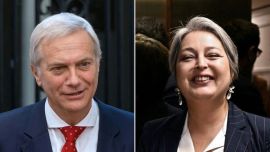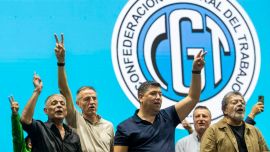Cristina Fernández de Kirchner's conviction for corruption is the most likely scenario for the political map of the near future.
The evolution of the trial investigating irregularities in public works projects in Santa Cruz Province makes it possible to forecast a ruling by the Federal Oral Court 2 for Criminal Matters for before or after the judicial holiday: next December or March, and an eventual confirmation of the sentence by Chamber 4 of the Federal Cassation Court at the end of 2023 or the beginning of 2024, at the same time as an appeal to the Supreme Court is lodged.
There is much speculation about the example of fellow former president and lawmaker Carlos Menem, who died without the Supreme Court having confirmed his conviction for many years. That allowed him to be a senatorial candidate and enjoy the privileges that come with it. But these times of current political sensitivity are not like those were and the final judgement on the vice-president would come within the next presidential term.
If what is the most likely outcome today comes to pass, Cristina Fernández de Kirchner would likely be occupying a senatorial seat representing Buenos Aires Province, having been elected for six years on December 10, 2023, and would have her privileges in place until December 9, 2029, but she would not be able to be a candidate again because, with a final conviction, as she would be disqualified from holding public office for life. From the moment the Supreme Court makes the Cassation Court ruling final, it will no longer be possible to speculate about a possible candidacy for president in 2027, as it is still possible to do today for 2023, thus affecting the political climate in four years' time.
Most importantly, such an event will affect the political climate from 2023 onwards because a conviction, even if it is not final, will affect Cristina's mood. Her list of those responsible will not only include the judges and prosecutors involved in her conviction but also those who are politically responsible, starting with President Alberto Fernández.
The vice-president's possible anger would surely be directed at her running-mate, exacerbating the perception that it is the president himself who is the first official to “fail to function,” to the point of not having been able to prevent this conviction. In her eyes, Alberto Fernández's first ineffectiveness would not lie in his lack of achievements in office but in his failure to secure her acquittal.
Such a scenario could lead to the fracture of the Frente de Todos coalition, even if Sergio Massa's administration of the Economy Ministry goes well. The built-up resentment between Alberto Fernández and Cristina Fernández de Kirchner, currently contained by the crisis uncovered by the departure of ex-economy minister Martín Guzmán, would explode with greater force, dramatically altering the electoral map before the candidates for the PASO primaries are due to be registered in the second quarter of next year.
Aftershocks
A fracture of the ruling coalition could also carry consequences for the opposition. It would damage unity within Juntos por el Cambio, which was brought together by the need to face a dominant Kirchnerism. An opponent that is waning could trigger individualistic ambitions currently contained by an external threat. And at the same time it would re-empower libertarians – the division of the main coalitions could generate a scenario of fragmentation where, with 20 percent of the total vote, a candidate can make it to the run-off.
This dystopia has been seen in recent elections in Chile (Gabriel Boric obtained 25 percent in the first round), Ecuador (Guillermo Lasso, 19 percent) and Peru (Pedro Castillo, 18 percent). The argument used to explain why Argentina is different from these Andean countries is that Chile, Ecuador and Peru do not have federal systems of government, nor is voting compulsory, as it is in our country.
But if we go back 20 years, the same thing happened in Argentina in the 2003 elections, when Néstor Kirchner eventually ended up becoming president having taken only 22 percent of the vote in the first round. On that occasion, Peronism was divided in three sectors: Menem, 24 percent; Kirchner, 22 percent; Rodríguez Saá, 14 percent. At the same time, liberalism with Ricardo López Murphy at the helm obtained 16 percent and a progressive front led by Elisa Carrió obtained 14 percent.
If Sergio Massa intends to be a competitive candidate for president in 2023, in addition to having first managed to straighten out the economy and then – an even more difficult task – to restore purchasing power to wages, he will face an even greater challenge: mediating between Cristina Fernández de Kirchner and Alberto Fernández so that the former's anger, following her conviction, is not vented on the latter. Although weakened, thanks to the mere fact that he holds the pen until December 9, 2023, the president will maintain a share of power and the ability to influence candidates, even if no-one will allow him to stand for re-election.
During the vibrant pleas from prosecutor Diego Luciani, comparisons were made with those delivered by prosecutor Julio Strassera in his famous "never again" speech of 1985. In one case, former commanders of all the dictatorships were being tried and in this currency case, all corruption is being judged symbolically. The examples of ‘Mani Pulite’ in Italy and ‘Lava Jato’ in Brazil indicate that social tolerance for corruption is greater than for military coups. Corruption can have degrees while a military coup cannot.
Either way, Cristina Fernández de Kirchner's exposure in this trial will be a deep blow to the vice-president's prestige and the legacy of her husband and the Kirchnerite governments, with significant political consequences.




















Comments